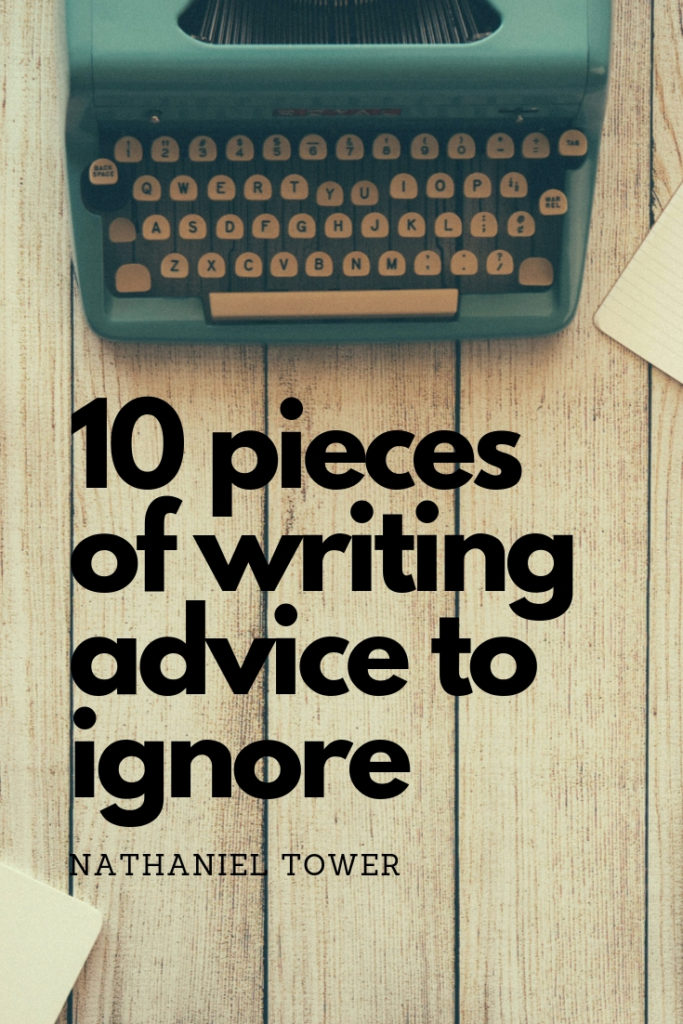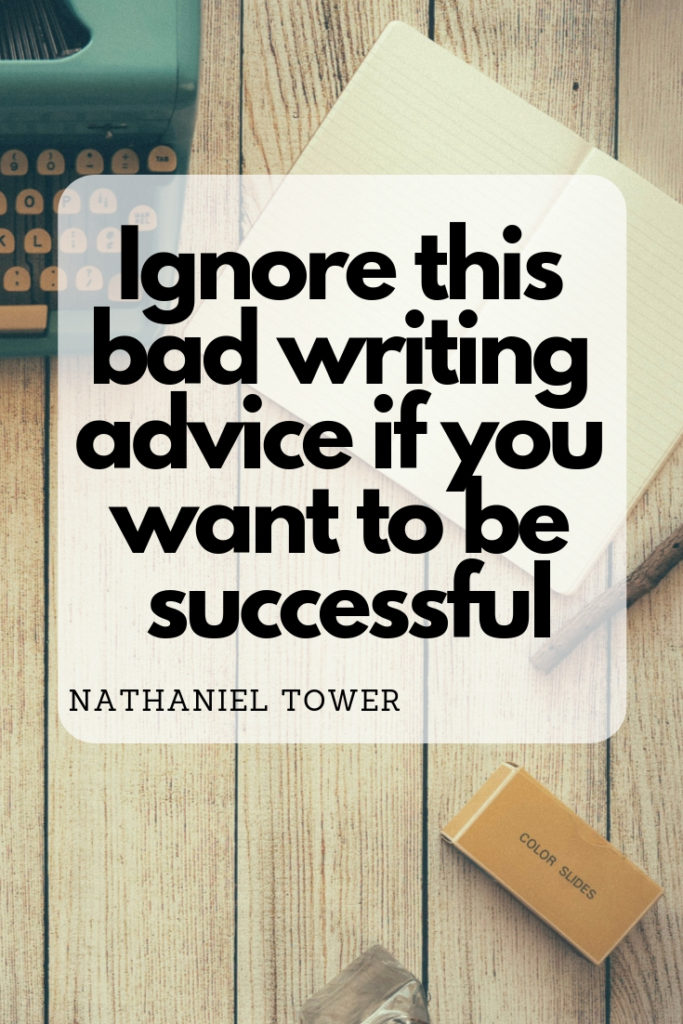Last Updated on June 3, 2023 by Nathaniel Tower
I had never read any of Jonathan Franzen’s work until I saw his list about how to write like him, or whatever the hell it was.
I would link it here, but I don’t want to give him any more attention.
But if you haven’t read it, it wasn’t very memorable other than to make him seem like a pretentious jerkwad that I never want to read. It’s certainly not likely to make you a better writer.

Anyway, the one thing Franzen’s list inspired me to do was create my own top ten list of writing advice that isn’t worth a damn thing. Here’s my take on some timeless writing advice as well as some modern hogwash that people try to sell writers.
Bad writing advice you should always ignore
- First and foremost, ignore any list that tells you how to write better.
- Why are you still reading this? I just told you to ignore these lists. This is one of the lists I want you to ignore. Just kidding. This is really an anti-list. That means I need another tip to avoid here. So let’s use this one – don’t let anyone tell you writer’s block isn’t real.
- Fine, you’re still reading, so I better give you some real advice. Ignore anyone who tells you to avoid all adverbs. You also need adjectives and verbs. Nouns are pretty good, too. Use parts of speech. All of them.
- The internet is a writer’s friend. Ignore anyone who tells you that good writers don’t use it. From research to promotion to community building, it has so many applications for writers. Yes, it can be a distraction, but only if you let it be one. This goes for AI writing tools as well. They are tools. Use them.
- Writing every day is bullshit. It’s okay to take some days off. You don’t have to force it. If you want to write every day, that’s awesome. But it doesn’t work for everyone. Write when you want to write.
- Self-publishing is cool. So is submitting to tons of agents. And so are lit mags that don’t pay you. Do what works for you and screw anyone who tells you not to do what you’re doing. Anyone who says self-published writers aren’t real writers is a pretentious wad of gum stuck to the bottom of a muddy boot.
- You don’t need an MFA to be a great or successful writer. Some of the best writers in the world have never formally studied the craft of writing in an academic setting. Some people with MFAs are terrible writers. If you want an MFA because you’re passionate about writing and want to study it deeper in a formal setting, then get one. But don’t do it because you think it’s a prerequisite for making money as a writer.
- Nothing is unpublishable. If someone says your work is unpublishable, then that just means it isn’t for them. Everything is publishable if you find the right venue. Even really bad writing has its place in today’s world. Just spend a few minutes browsing books on Amazon and that should be pretty obvious.
- You don’t need to hire a professional editor before sending out your manuscript. It might help. But it might also be a huge waste of money. Instead of going to a professional editor, make sure you’ve revised it thoroughly yourself. After that, try a few beta readers. Do a manuscript swap. They read yours, you read theirs.
- Wow, I wasn’t prepared for anyone to still be reading this. So let’s make the last tip about how you should read more than you write. Enough with the advice. Just go write. The only ways to get better at writing are writing and reading. And when I say reading, I don’t mean reading lists.
There you have it. Obviously not every writing tip should be ignored, but there’s a lot of bad writing advice out there. Bottom line: do what works for you and forget about the rest.
What are your favorite writing tips to ignore? Share your thoughts in the comments.


I really can’t abide (or understand) the dictum that the only acceptable dialogue tag is some version of “said.” What a waste of a verb! “‘I love you,’ he said” is not the same as “I love you,’ he shouted” as “‘I love you,’ he moaned.”
I think writers are mostly full of self doubt, and the absolutes of writing “rules” are seductive. Shame.
Paul, I’m 100% with you. Only using “said” is absurd. Yeah, there are some terrible dialogue tags out there, but only using “said” is boring and doesn’t convey the right meaning all the time.
Don’t be seduced by those writing rules!
Great list 👏🏻. Thank you.
I agree with everything you said about using adverbs and other parts of speech. If using adverbs is so wrong why the hell torture us with them in grade school? Now, if you want to question something, why did we waste so much time on something as useless as diagramming sentences? Hmmmm?
Your list is common sense, so I kept on reading it. I’m tired of the lists. Don’t use adverbs. Don’t use italics. I read an article by a so-called expert who shall remain nameless, and he persists in saying that if you did this or did that then breaking his precious rules “makes you look like an amateur.” The hilarious thing was that he’s written one published nonfiction piece so he thinks that automatically qualifies him to pass judgment on what’s right for fiction writers.
Thank you for reading and commenting. I’ve been guilty of writing a few lists in my life, but I’m also tired of these “do it my way or you aren’t any good at writing” lists. They aren’t productive and hurt the writing community as a whole. Good luck on your writing!
Sorry to add to the lists! But there is a good set of 18 Rules to Writing here –
https://lifeassistanceagency.com/2015/01/16/writing/
Looking for advice means you are not writing!
I’m assuming this is not a dead link so, here goes:
I live by two writing rules from different sources, and can’t remember who they were from originally. However, as Andy Warhol once said: “Good artists borrow, great artists steal”, and he should know.
1: Write what excites you, not what you know. You can always find out and writing what you know will probably bore the reader. As you said yourself, the internet is great for research, although I love to read books as well.
2: Finish your first draft before you start editing, rewriting, or making other significant changes which are all ways of procrastinating.
I know so many people “whose friends know them as writers” who never complete a manuscript because they are endlessly reworking what they’ve already written.
Someone on Pinterest posted a meme which I like:
The purpose of a first draft is to get it written, not get it right.